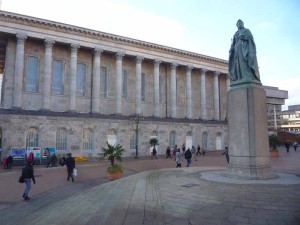Dave Woodhall reports back on yesterday’s Mayoral ‘debate’.
The latest in the round of mayoral meetings, which took place at Birmingham Town Hall on Sunday afternoon, showed that while the Yes campaign remains firmly on course to win the vote, the debate has still failed to grab public attention.
The intriguingly-named ‘Speed Date the Candidates’ event scheduled for Victoria Square didn’t appear to take place, and less than a hundred people were in attendance in the Town Hall, many of these either media or campaign organisers. That they could hire such a prestigious venue seemed at odds with the “grass roots campaign” claimed by Yes leader Julia Higginbottom during her opening speech, which set the tone for an event that frequently strayed into patronising the audience – one speaker from the floor saying that to vote no would indicate that the people of Birmingham didn’t think themselves ready to have power over their own destiny.
This was clearly not a debate in the accepted sense. With eight of the nine guests openly in favour of a yes vote and four of them seeking to become mayor, it was more in the nature of a rally. But unlike most political rallies it failed to ignite its audience, and neutrals would have been forgiven for thinking that if this is the best Birmingham politics has to offer, maybe it doesn’t need another layer of government.
As so many of the speakers were in favour of one side of the argument and with questions answered in groups, meaning awkward ones could be conveniently sidetracked, there was little evidence of the increased democracy campaigners claim a mayoral election would bring.
Indeed, the speakers failed to successfully answer the questions they raised themselves. The most common call from the platform was that an elected mayor can claim to speak for a million people, which can also be done by the existing leader of the council. There was a desire to engage with the inner cities and in particular young people, yet of the nine speakers, all were male, all appeared to be middle-aged and seven were white. Public transport was seen as one of the key areas in which an elected mayor could make a difference; it was not explained how they could deal effectively with the private companies who currently make up our shambolic public transport network, almost all of whom run services that are not exclusively run inside Birmingham.
As for the most common criticism of the election, that we will be asked to vote for a mayor without knowing the extent of their remit, would-be candidates were of the opinion that it would be better to wait until after the result is known before delegating powers. This must surely be the first time in political history that candidates for elected office don’t want to know what exactly the position is that they are standing for. The conclusion to be drawn from this particularly fudged answer is that all those on show, whether independent or party-backed, know that this is a flaw in their argument and one to which there is no real answer. To say, as did would-be Labour candidate Liam Byrne, that a proposed mayor might ask for less power than Downing Street would be prepared to grant, flies in the face of all logic.
In fact, potential independent candidate, barrister Mirza Ahmad, admitted that the powers that could be used by an elected mayor are already in place, but need to be delegated differently. Which begs the question; why go to the trouble of an election?
As the afternoon drew to a close, proposed independent candidate Desmond Jaddoo said that candidates have to capture the imagination of the electorate. So far, like the campaign in general, none have done so.



